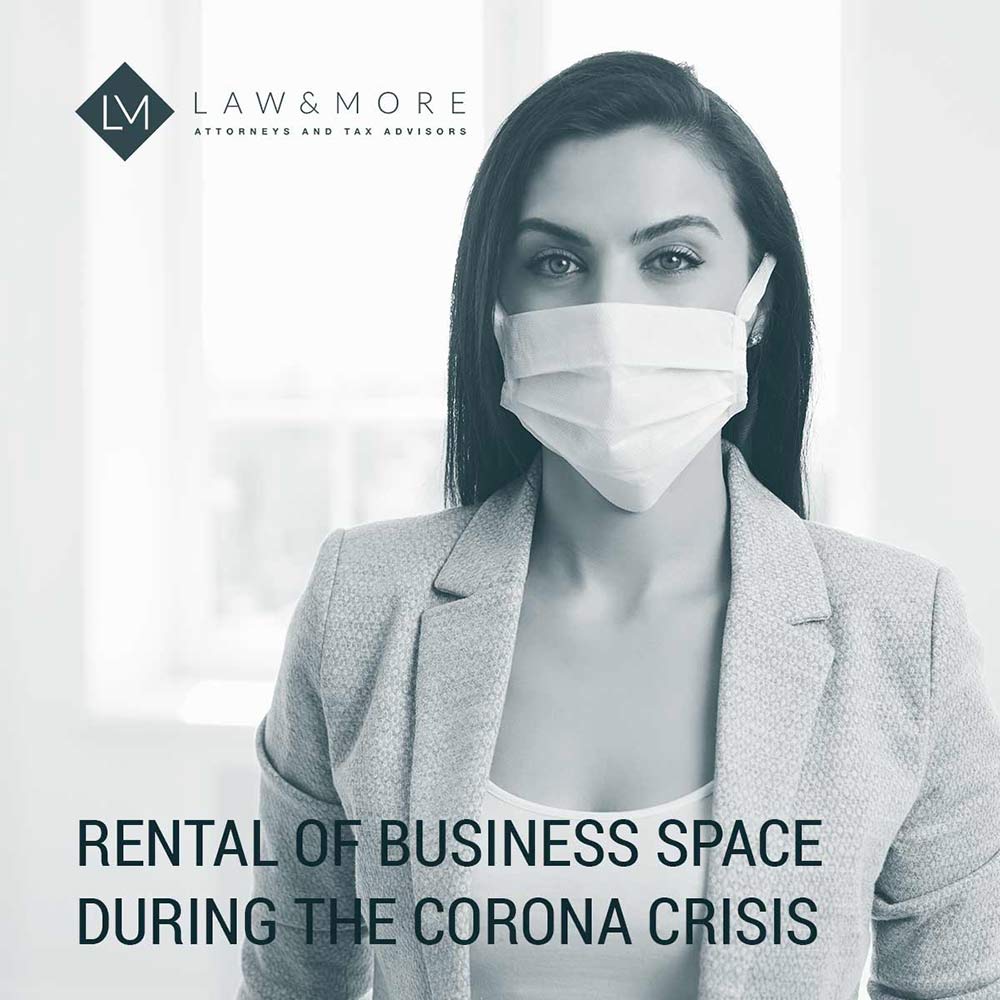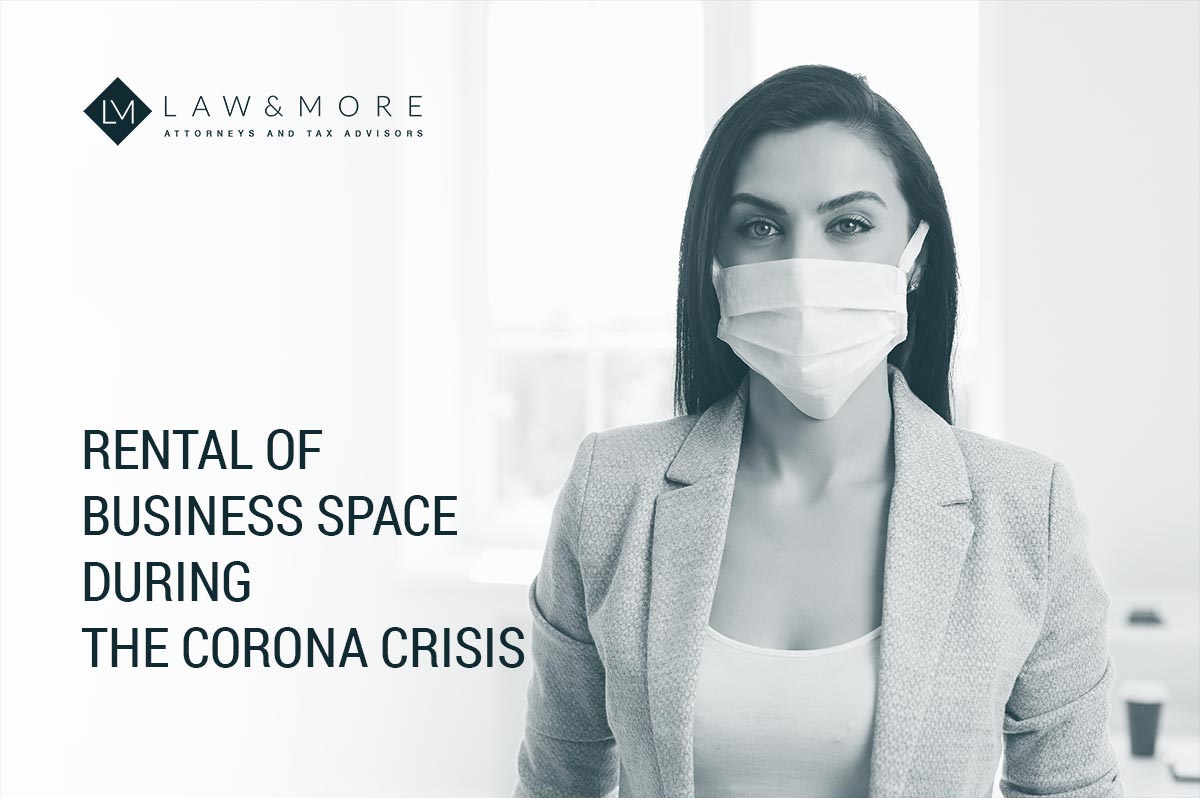The whole world is currently experiencing a crisis on an unimaginable scale. This means that governments also have to take extraordinary measures. The damage that this situation has caused and will continue to cause can be enormous. The fact is that no one is currently in a position to assess the scale of the crisis, nor how long it will last. Regardless of the situation, the leases of business premises are still in force. This raises several questions. In this article we would like to answer a few questions that may arise with tenants or landlords of business premises.
The payment of the rent
Do you still have to pay the rent? The answer to this question depends on the circumstances of the case. In any case, two situations must be distinguished. Firstly, business premises that may no longer be used for business purposes, such as restaurants and cafés. Secondly, there are shops that may still be open, but which choose to close their doors themselves.
The tenant is obliged to pay rent based on the tenancy agreement. If this does not happen, it is a breach of contract. Now the question arises, can there be force majeure? Maybe there are agreements in the tenancy agreement about the circumstances under which force majeure can apply. If not, the law applies. The law states that there is force majeure if the tenant cannot be held responsible for non-compliance; in other words it is not the tenant’s fault that he cannot pay the rent. It is unclear whether the failure to meet the obligations due to the coronavirus results in force majeure. As there is no precedent for this, it is difficult to judge what the outcome will be in this case. What does play a role, however, is the frequently used ROZ (Real Estate Council) contract in this type of rental relationship. In this contract, a claim for rent reduction is excluded as standard. The question is whether a landlord can reasonably maintain this point of view in the current situation.
If the tenant chooses to close his shop, the situation will be different. However, there is currently no obligation to do so, the reality is that there are less visitors and therefore less profit. The question is whether the circumstance should be entirely at the expense of the tenant. It is not possible to give a clear answer to this question because every situation is different. This must be evaluated on a case-by-case basis.
Unexpected circumstances
Both the tenant and the landlord may invoke unforeseen circumstances. In general, an economic crisis is accountable on the behalf of the entrepreneur, although in most cases this can be different because of the corona crisis. The measures implemented by the government can also be taken into consideration. A claim based on unforeseen circumstances gives the opportunity to have the lease amended or annulled by the court. This is possible in case that a tenant can no longer reasonably be held to continuation of the agreement. According to parliamentary history, a judge has to act with restraint regarding this matter. We are also now in a situation that courts are closed as well: it will therefore not be easy to obtain a verdict quickly.
Deficiency in the rented property
The tenant may claim a reduction in the rent or compensation in case of a shortcoming. A deficiency in condition of the property or any other condition results in not having the rental enjoyment a tenant was entitled to at the start of the rental agreement. For example, a deficiency may be: construction faults, a leaking roof, mould and inability to obtain an exploitation permit due to the absence of an emergency exit. Courts are generally not eager to judge that there is a circumstance that must be for the account of the landlord. In any case, poor business due to the absence of a public is not a circumstance that should be charged to the landlord. This is part of the entrepreneurial risk. What also plays a role is that in many cases the rented property can still be used. Therefore more restaurants, are delivering or having their meals picked up as an alternative.
The exploitation obligation
Most leases of business premises include an operating obligation. This means that the tenant must use the rented business premises. In special circumstances, the obligation to exploit may arise from the law, but this is not always the case. Nearly all landlords of business and office premises make use of the ROZ models. The general provisions associated with the ROZ models state that the tenant will use the leased space “effectively, completely, properly and personally”. This means that the tenant is subject to an operating obligation.
So far, there is no general government measure in the Netherlands ordering the closure of a shopping centre or office space. However, the government has announced that all schools, eating and drinking establishments, sports and fitness clubs, saunas, sex clubs and coffee shops should remain closed nationwide until further notice. If a tenant is obliged by order of the government to close the rented property, the tenant will not be liable for this. This is a circumstance which, according to current national situation the tenant should not be held accountable. Under the general provisions, the tenant is also obliged to follow government instructions. As an employer, he is also obliged to ensure a safe working environment. This obligation derives by not exposing the employees to the risk of contamination of coronavirus. Under these circumstances, the landlord cannot force the tenant to operate.
Due to healthcare of staff and/or customers, we see that tenants themselves also choose to voluntarily close the leased property, even if they have not been instructed to do so by the government. Under the current circumstances, we believe that landlords will not be able to file a claim for fulfilment of the obligation, payment of fines or compensation for damages. Based on rationality and fairness, as well as the obligation to limit the damage on the part of the tenant as much as possible, we find it difficult to imagine that a landlord will object to a (temporary) closure.
Different use of the rented property
Food and beverage establishments are closed at the moment. However, it is still allowed to pick up and deliver food. However, a rental agreement provides most of the time a strict purpose policy; what makes picking up different from a restaurant. As a result, a tenant may act contrary to the rental agreement and – possibly – forfeit fines.
In the current situation, everyone has a duty to limit his or her damage as much as possible. By switching to a pick-up/delivery function, a tenant complies. Under these circumstances, it is difficult in all reasonableness to defend the point of view that this is contrary to the contractual purpose. In fact, a landlord is more likely to have a claim on the tenant if the tenant does not do everything in its power to keep its business running to be able to pay the rent.
Conclusion
In other words, everyone is obliged to limit their damage as much as possible. The government has already announced far-reaching measures to help entrepreneurs and reduce their financial pressure. It is recommended to use the possibilities of these measures. If a tenant refuses to do so, it may be considered difficult to pass the losses on to the landlord. This also applies vice versa. Meanwhile, politicians have also called on landlords to moderate the rent over the coming period, so that the risk is shared.
Although the tenant and landlord have a contractual relationship with each other and the principle of ‘a deal is a deal’. We recommend talking to each other and looking at the possibilities. The tenant and landlord may be able to meet each other in these exceptional times. While the tenant has no income due to the closure, the landlord’s expenses also continue. It is in everyone’s interest that both businesses survive and overcome this crisis. This way, the tenant and the landlord can agree that the rent will temporarily be paid partially and the shortfall will be caught up when the business premises are reopened. We have to help each other where possible and, besides, landlords do not benefit from bankrupt tenants. After all, a new tenant is not easily found in these times. Whatever choice you make, do not make hasty decisions and let us advise you on the possibilities.
Contact
Because the current situation is so unpredictable, we can imagine that this can raise many questions for you. We keep a close eye on developments and are happy to keep you informed of the latest state of affairs. If you have any questions about this article, please do not hesitate to contact lawyers of Law & More.

